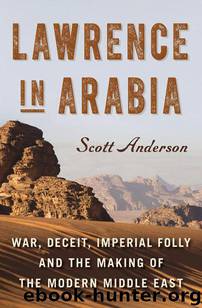Lawrence in Arabia: War, Deceit, Imperial Folly and the Making of the Modern Middle East by Scott Anderson

Author:Scott Anderson [Anderson, Scott]
Language: eng
Format: epub, mobi
Tags: World War I, International Relations, Diplomacy, General, Middle East, Political Science, Military, History
ISBN: 038553292X
Publisher: Doubleday
Published: 2013-08-06T00:00:00+00:00
TO THE ANNOYANCE of defense-minded military commanders throughout history, civilians have a tendency to stay put in their homes until an enemy invading force is just over the horizon. Then, once the arrows or bullets or missiles begin to fly, these civilians bundle up their families and as many possessions as time allows and take to the roads in whatever conveyance is available to them. Predictably, the most common result of this rushed exodus is severe traffic congestion—and often complete paralysis—on all paths leading away from the battlefront, making it extremely difficult for the defending force to bring reinforcements to the scene. To guard against this, armies have routinely forced civilians out of a likely battle zone well ahead of time—and at bayonet point if required. Due to the stasis of the battle lines, such forced evacuations had rarely been necessary on the Western Front through the first two and a half years of World War I, but they had been a common feature in the east, and most especially on the Ottoman Front.
It was a policy that came quite easily to the Ottomans, and for reasons that went beyond simple military expediency. Many times over the centuries, the sultans in Constantinople, mindful of both their comparative military weakness and the polyglot nature of their empire, had adopted a kind of scorched-earth policy in the face of external threat, uprooting entire populations that might tacitly or overtly collaborate with invaders. Time permitting, also removed from an invader’s path were livestock, farm equipment, and food stores, most anything that might provide the enemy sustenance, and that which couldn’t be taken away was burned, smashed, or poisoned.
For all their reformist ideas in other spheres, the Young Turks had seen little reason to revisit this tradition when they came to power in 1908; more likely, they’d simply been overwhelmed by the pace of events. During the Balkan Wars of 1912–13, entire civilian populations were forcibly ejected by most all the combatant armies, less for reasons of military convenience than in pursuit of a policy that a century later would become known as ethnic cleansing. That massive if largely forgotten human tragedy—hundreds of thousands of Turks, Bulgars, Macedonians, and Greeks were permanently expelled from their ancestral homes—set the precedent for the far more brutal and deadly expulsion of Anatolia’s Armenian population beginning in the spring of 1915. Despite that ghastly recent example and his own efforts to ameliorate it, when Djemal Pasha found his own Syrian realm under threat in early 1917, it was to the policy of expulsion that he turned.
At first there was nothing controversial about it. In late February, with the British invaders massing below Gaza and clearly about to strike, he had ordered the evacuation of that town’s population, perhaps twenty thousand civilians in all. It was a move the Syrian governor had every reason to congratulate himself on; when the British attack came in late March, the cleared roads to the north and east of Gaza had allowed the Turks to rush in reinforcements and carry the day.
Download
Lawrence in Arabia: War, Deceit, Imperial Folly and the Making of the Modern Middle East by Scott Anderson.mobi
This site does not store any files on its server. We only index and link to content provided by other sites. Please contact the content providers to delete copyright contents if any and email us, we'll remove relevant links or contents immediately.
| Arms Control | Diplomacy |
| Security | Trades & Tariffs |
| Treaties | African |
| Asian | Australian & Oceanian |
| Canadian | Caribbean & Latin American |
| European | Middle Eastern |
| Russian & Former Soviet Union |
The Secret History by Donna Tartt(16606)
The Social Justice Warrior Handbook by Lisa De Pasquale(11485)
Thirteen Reasons Why by Jay Asher(7780)
This Is How You Lose Her by Junot Diaz(5753)
Weapons of Math Destruction by Cathy O'Neil(5029)
Zero to One by Peter Thiel(4816)
The Myth of the Strong Leader by Archie Brown(4785)
Promise Me, Dad by Joe Biden(4440)
Stone's Rules by Roger Stone(4412)
Beartown by Fredrik Backman(4403)
How Democracies Die by Steven Levitsky & Daniel Ziblatt(4392)
The Fire Next Time by James Baldwin(4336)
100 Deadly Skills by Clint Emerson(4070)
A Higher Loyalty: Truth, Lies, and Leadership by James Comey(4024)
Rise and Kill First by Ronen Bergman(4008)
The David Icke Guide to the Global Conspiracy (and how to end it) by David Icke(3875)
The Farm by Tom Rob Smith(3869)
Secrecy World by Jake Bernstein(3773)
The Doomsday Machine by Daniel Ellsberg(3725)
